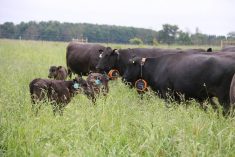Asian and Pacific nations are snapping up our beef while EU roadblocks persist
When it comes to Canada’s two big foreign trade deals, the difference for beef producers is night and day — one is putting money in their pockets and the other has mostly been an exercise in frustration.
In just the first two years of the three-year-old Trans-Pacific trade deal, member nations upped their buys of Canadian beef by a third and by even more this year, the Canadian Cattlemen’s Association said in a recent release hailing the prospect that China, Taiwan and the U.K. may soon join the deal.
And the best is yet to come, said CCA president Bob Lowe.
“We expect the Asian region to hold the largest potential for growth in beef demand over the next 25 years and securing further access to key Asian markets is a priority for us,” said Lowe, a Nanton-area rancher and feedlot owner.
The trade deal with the unwieldy name (officially the Comprehensive and Progressive Agreement for Trans-Pacific Partnership but widely called CPTPP) is “an excellent story,” said Fawn Jackson, the CCA’s director of policy and international affairs.

“This year, we’re expecting to hit another third record when it comes to trade,” she said. “This is attributed to the progressive nature of CPTPP, particularly Japan being a good market for us.”
While the U.S. is (by far) the biggest buyer of Canadian beef and veal, countries that are either members of the Trans-Pacific agreement or thinking of joining occupy the next five spots — and all have upped their purchases dramatically this year.
Sales to Japan jumped 36 per cent — to $287 million — as of the end of August, according to Canada Beef data. During that same period, Mexico more than doubled its purchases (to $127 million) as did China ($122 million). Meanwhile sales to Vietnam nearly quadrupled (to $60 million) while South Korea purchases were also up substantially (to $55 million).
Japan and Mexico are original members of the deal, China, Taiwan and the U.K. have all officially applied to become members, and South Korea is thinking of applying.
“It’s an interesting time for CPTPP because of all the new interest in it,” said Jackson. “As countries look at economic recovery, it’s undeniable that trade plays a very significant role in that. With the U.K., South Korea, Taiwan and China all interested, there are going to be many conversations that are going to be had about the value of trade.”
But the main one is likely to be along the lines of ‘don’t mess this up.’
“We are encouraged to see other countries’ interest in joining CPTPP, as long as they meet the ambitious nature of the trade agreement, which should open and expand exports for Canadian beef farmers and ranchers,” Lowe said.

A failure to launch
The Trans-Pacific deal stands in sharp contrast to the one with Europe.
Although the Canada-European Union Comprehensive Economic and Trade Agreement — a.k.a. CETA — is older (it was signed five years ago), it’s largely been a bust in terms of boosting exports. Last year, just $33 million worth of Canadian beef was exported to all of Europe, with half of that going to the U.K., which is no longer a member of the European Union.

“It’s a slow process with lots of bureaucracy,” said Doug Sawyer, co-chair of the CCA’s foreign trade committee.
“It’s been very frustrating for me, personally, in how slow they have been to respond to the spirit of the agreement. And trying to get them to live up to the spirit of the agreement has not been easy.”
The Pine Lake rancher is a big believer in trade deals but he points to the U.K. and says it will be much better having that nation in the Trans-Pacific pact — and out of the European one.
“I think that will be a huge bonus to us,” he said. “That (Trans-Pacific deal) is straightforward — either you comply with the terms of your agreement or you’re not in.
“With CETA, they are not living up to the whole spirit of the agreement.”
In theory, the trade deal should have seen a boom in beef exports to Europe. The agreement gave Canada 50,000 tonnes of tariff-free quota but only 835 tonnes were sent to the EU last year.
A big part of the reason is so-called non-tariff barriers, which can range from specific production protocols to meeting documentation requirements.
The pandemic hasn’t helped, whether that’s in terms of negotiations with EU trade officials or having face-to-face meetings with potential buyers. However, personal relationships tend to play a large role in winning sales in Asian and Pacific markets, noted Sawyer, and yet sales to that region are continuing to climb sharply.
“In that Pacific Rim, it’s about relationship building — it is in CETA as well, but it’s not the same,” he said. “It’s about relationships and trust and that carries forward. What you run the risk of in this extended pandemic is that people change seats. That’s what the risk is to us — we’ve got a relationship with this person, and then that person moves on, and you have to start the relationship again.”
But Canada’s reputation for quality has helped a great deal, he added.
“That reputation that we’ve built over decades is the only reason we’re able to move forward.”
Despite the slow going, no one is writing off the trade deal with Europe — and officials note it is both a different market and a valuable one. And that’s reflected in the trade stats.
While the U.S., Japan, Mexico, China, Vietnam and South Korea are the Top Six in terms of total sales, none are near the top of the list when it comes to price paid per kilogram. While the former all pay about $7 to $9 a kilo — this year the Netherlands has paid an average of more than $21 a kilogram, Italy $17 and Belgium nearly $14, albeit on small volumes (each had only imported a couple of hundred thousand kilos of Canadian beef as of August).
High prices are partly a necessity because exporters need “to cover the other costs of doing the audit and hormone free and all those sorts of things for the European beef,” said Jackson.
But it also reflects the fact that European buyers will pay more to get what they want.
“It’s a market that appreciates high-value, high-quality beef,” she said. “It’s one we are going to continue working on, particularly we’re going to focus on making the audit process more streamlined.
“We’ll continue to have conversations with them that will hopefully lead to better outcomes in the future.”
















